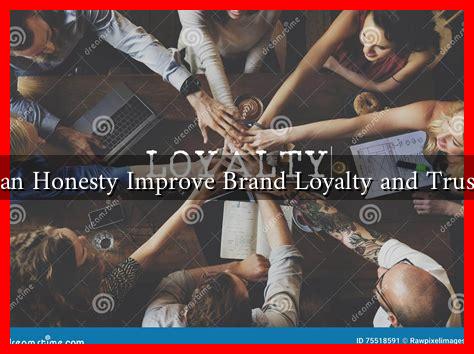-
Table of Contents
Can Honesty Improve Brand Loyalty and Trust?
In today’s competitive marketplace, brands are constantly seeking ways to differentiate themselves and build lasting relationships with their customers. One of the most effective strategies for achieving this is through honesty. This article explores how honesty can significantly enhance brand loyalty and trust, supported by relevant examples, case studies, and statistics.
The Importance of Honesty in Branding
Honesty is not just a moral virtue; it is a critical component of successful branding. In an era where consumers are increasingly skeptical of marketing messages, brands that prioritize transparency and authenticity can stand out. Here are some reasons why honesty is essential in branding:
- Builds Trust: Trust is the foundation of any relationship, including those between brands and consumers. When brands are honest, they foster a sense of reliability.
- Enhances Reputation: A brand known for its honesty is more likely to be viewed positively by consumers, leading to a stronger reputation.
- Encourages Customer Loyalty: Customers are more likely to remain loyal to brands that they perceive as honest and transparent.
Case Studies: Brands That Embrace Honesty
Several brands have successfully leveraged honesty to build trust and loyalty among their customers. Here are a few notable examples:
1. Patagonia
Patagonia, the outdoor clothing brand, is renowned for its commitment to environmental sustainability and ethical practices. The company openly shares its supply chain practices and encourages customers to buy less by promoting the repair and reuse of its products. This transparency has cultivated a loyal customer base that appreciates the brand’s integrity.
2. Buffer
Buffer, a social media management platform, is another example of a brand that prioritizes honesty. The company shares its revenue, employee salaries, and even its mistakes publicly. This level of transparency has not only built trust with its users but has also attracted a community of advocates who appreciate the brand’s openness.
Statistics Supporting Honesty in Branding
Research indicates that honesty significantly impacts consumer behavior. According to a study by the Harris Poll, 81% of consumers stated that they need to be able to trust the brand to buy from them. Furthermore, a survey conducted by Accenture found that 63% of consumers prefer to purchase from companies that are transparent about their business practices.
How to Foster Honesty in Your Brand
To cultivate honesty within your brand, consider the following strategies:
- Be Transparent: Share information about your products, services, and business practices openly with your customers.
- Admit Mistakes: If your brand makes a mistake, acknowledge it publicly and take steps to rectify the situation.
- Engage with Customers: Encourage feedback and actively listen to your customers’ concerns. This shows that you value their opinions and are committed to improvement.
- Communicate Values: Clearly articulate your brand’s values and mission, and ensure that your actions align with these principles.
Conclusion: The Long-Term Benefits of Honesty
In conclusion, honesty is a powerful tool for building brand loyalty and trust. Brands that prioritize transparency and authenticity not only enhance their reputation but also foster deeper connections with their customers. As demonstrated by successful companies like Patagonia and Buffer, embracing honesty can lead to long-term benefits, including increased customer loyalty and advocacy.
In a world where consumers are increasingly discerning, brands that choose to be honest will not only survive but thrive. By implementing strategies that promote transparency and integrity, businesses can create a loyal customer base that stands by them through thick and thin.

